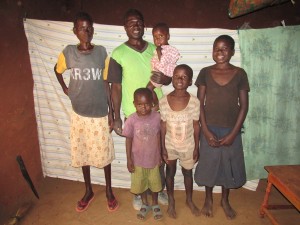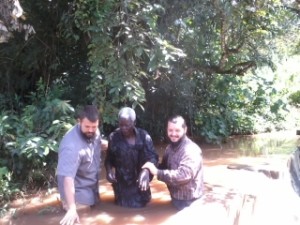 This is David, along with his wife, Violet, and four of their six children. David is a pretty big guy. Our two oldest boys were testing his strength this morning, and they found it amusing that he could pick up 13 year-old Jonah with one arm and hold him in a seated position on his bicep.
This is David, along with his wife, Violet, and four of their six children. David is a pretty big guy. Our two oldest boys were testing his strength this morning, and they found it amusing that he could pick up 13 year-old Jonah with one arm and hold him in a seated position on his bicep.
I’m not sure how long David has been a part of our fellowship…maybe six months? He and Isaiah somehow became fast friends when Isaiah was overseeing a bunch of guys (including David) as they dug a local fish pond. In fact, the effort to communicate with David (who speaks very little English) was what made Isaiah functionally fluent in Swahili.
David had been living somewhat far away when he responded to the message of the Kingdom and was baptized. That, combined with the fact that he struggles with reading (as far as we know), made for a slow process of discipleship. At one point, the church elders had to address a significant issue with him, but he showed sincere repentance and one of the next steps was a willing move to a location closer to the fellowship so that he could grow stronger spiritually. He lived right across the path from us for a while, was forced to move, and then found another place across the main road. There are several brothers who live near each other there, so it’s a great way for them all to mutually encourage one another. The accountability has also been good for David.
One thing we’ve all noticed about David is that he’s a really good Dad. His children obviously love and respect him and he’s cared for them well as his wife has recently struggled with illness. However, Isaiah (who spends a lot of time at David’s house) did report that David has a bit of a temper when the children misbehave.
Sunday at our communion meal, a large group of about 20 adults ate together and then were encouraged by our brother Sam to examine ourselves in preparation for sharing in the body and blood of Christ. This is always a quiet and introspective time and although public confessions are encouraged, they are somewhat rare. Such a thing is just not a part of African culture. This week, however, was an exception. Many stood to confess and share their struggles and ask for prayer. David was one of them–the first time he’s publicly shared during our fellowship meal.
The night before, he had been sleeping at his home farm some distance away. He still has a house there, which has a sleeping mat and a few other things in it because he stays there when it’s time to plant or harvest beans or maize. Although a vacant house is usually an invitation for robbery or vandalism, David’s brothers live close by so there have thus far been no problems. However, on this particular Saturday night as David was sleeping, he reported that he was awakened by some unusual noises outside the house. He went out with his spotlight and found nothing, so returned to bed.
Some time later, he was abruptly awakened by some more noises. Though nothing obvious, he knew it meant trouble. He said that he got out of bed and stood by the window. (His house is a mud-and-stick construction with one window and one door, which is typical in our area.) Soon, water began to seep in around the window and he guessed that there were three men outside trying to break through the wall and enter the house. He simply waited quietly in the dark with a fimbo (a straight club with a large round ball on one end, which can easily finish someone) and a flashlight in his hands.
Eventually, one of the men worked his way in, leaving his two friends outside. David reported that he struggled internally; his strong reaction was to beat the man and cause the robbers to leave. (You must understand that here, robbers don’t just come to steal and then quietly leave. In the face of any opposition, they typically have and use machetes or knives to defend themselves. It’s kill-or-be-killed, since any robbers caught in the act are typically subject to vigilante justice, often having petrol poured on them and a match lit.)
However, David said, he had “another voice” telling him not to follow his natural reaction. Instead, he quickly positioned himself in front of the broken-through wall and shined his spotlight in the face of the intruder. In his own words, he “shined his light, and the man fell down!” He told the man, “You will not get out of here!” and tied his hands together. He then called his brothers, and the men all stood watch until morning, when it was determined that the man was a neighbor and should be freed without repercussions. His friends had already fled.
I wondered, if David had not sinned against the man, why was he standing to confess? And then he admitted that he felt that his feelings of anger were sin and he was asking for forgiveness and prayer.
After the Communion meal, we talked as a family. Marc wondered aloud if, when David said, “he shined his light and the man fell down!,” that was an African way of confessing that he had turned on his flashlight and then beamed the guy in the head with the club. (This is not a big stretch if you understand the differences between our Western-style of communication and their Eastern style.) So he sent Isaiah to David’s house to “confirm.” As it turned out, David did, indeed, refrain from doing harm to the man, choosing instead to “love his enemies” and “not resist an evildoer,” as Jesus had commanded. The intruder, expecting to break through the wall into an empty house, was probably just greatly surprised to find that he was not alone. Given David’s size, I can understand his reaction.
With the struggles we sometimes face in the lengthy and difficult process of discipleship, David’s testimony of this weekend stands as a great encouragement not only to us, but to our entire fellowship. It demonstrates the work of the Holy Spirit to reveal the truth of Jesus’ teachings and God’s upside-down Kingdom, and the power of the Holy Spirit to help us walk in that truth, even when our flesh would prompt us to do otherwise. Join me in praising God and in praying for David and others in our fellowship here who are striving to enter the narrow gate and follow the path that leads to eternal life.

